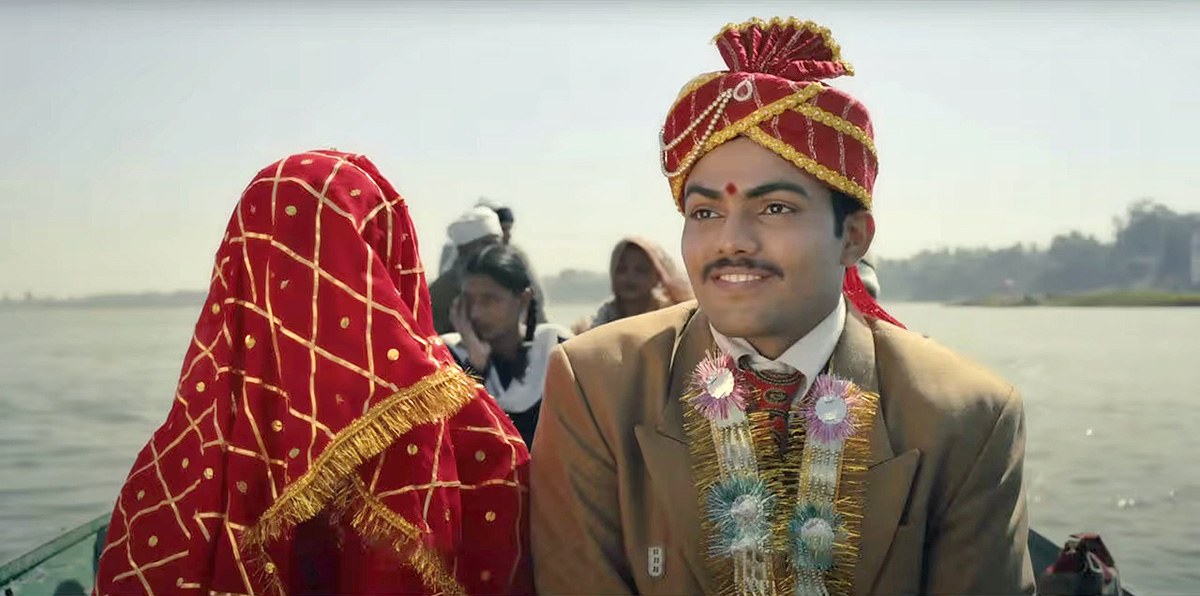Laapataa Ladies is gentle yet firm in calling out the hypocrisies colouring everyday mindsets and prejudices without acquiring the high-handedness of a crusader, observes Sukanya Verma.

What are the odds of more than one pair of newlyweds crowding a compartment of Belpur-Katariya Express on a wintry January's day?
Quite high, it turns out when auspicious stars as per the unerring Hindu calendar align.
'Shubh din shaadi karke Shankar Parvati ban jaate hain,' scoffs a fellow passenger, both amused and inconvenienced, at the sorcery of shubh muhurats.
Set in 2001 in the fictional region of Nirmal Pradesh, the hinterland forms the heart of Kiran Rao's sophomore effort.
It paints a whimsical picture of people in the interiors governed by vishwas over vigyan.
What is refreshing is how Rao abandons the smug tone underlying satirical messaging to reimagine a society still capable of fixing its follies by finding its strength in subversion. And she achieves this delicate balance in the most jaunty, jovial fashion in Laapataa Ladies, which wears an air of optimism even when treading dangerous grounds.
Much like the twist in Rabindranath Tagore's novel Noukadubi, the ghoonghat is the source of all confusion in Rao's bridal mix-up as well.
That's just about all that it shares in common with Biplab Goswami's genial story where the ghoongat serves as a clever metaphor for all that's obstructed from view as well as an obstacle to break out from.
Aboard the Belpur-Katariya Express, Deepak (Sparsh Shrivastava) is escorting his young bride Phool (Nitanshi Goel) back to her marital home in Soorajmukhi.
Huddled in the same corner as them is another newly married couple, again the same generic red dulhan's attire adorned on its nondescript bride Jaya (Pratibha Ranta).
Without meaning to, Deepak takes off with Jaya while poor Phool is left stranded at the railway station.
What follows isn't a hacky lost and found drama but a sweet tale of sisterhood and spirit.
Often North India's perilous landscape is a hub for horror stories but in Rao's benign gaze, decency still abounds.
I found it remarkable how trustworthy her idealistic setup is, where we get to see a rarely ever documented face of humanity that has helped women move around freely despite patriarchy's looming threats.
Where Manju Maai (Chhaya Kadam), the tough-talking tea seller at the railway station, takes wide-eyed Phool under her wing, a self-reliant but guarded Jaya warms up to Deepa's joint family and friends.
The reasons prompting one to conceal her whereabouts and the other not to report the incident to the cops are telling of the social strain afflicting Phool and Jaya.
Rao addresses these disparities lightly in delightfully phrased fears suggesting crisis is more tolerable than cops, 'chota dukh chori, bada dukh thana'.
Indeed, the madcap attitude of a maverick inspector (Ravi Kishen in his element) at the helm of the curious case of the swapped brides is enough reason for alarm. Laapataa Ladies milks it fittingly for mirth and milieu without wavering from its objective of empowerment.
Yet, Phool's initiation into self-efficiency beyond matrimonial expectations and Jaya's agrarian skills put to good use aren't the only forces of feminism at work here.
The women folk (led by the elegant Geeta Aggarwal) in Deepak's family may not have the vigour of Manju Maai's no-bullshit voice but they are each other's strongest allies nevertheless.
Rao is respectfully embracing of their differences and convictions, which find a charming expression in dialogue writer Sneha Desai's lyrical play of words.
Or politics.
Like a character belonging to a town relentlessly rechristened from Indirapur to Atalnagar to Mayaganj, you get the drift, winking at the state of affairs.
Laapataa Ladies is gentle yet firm in calling out the hypocrisies colouring everyday mindsets and prejudices without acquiring the high-handedness of a crusader. As its good-humouredly told story energetically advances towards its predictable but pleasant outcome, Phool and Jaya have found an ardent cheerleader in the audience.
The young girls of Laapataa Ladies are a revelation.
If Pratibha's serene, sorted demeanour is tailor made for Jaya, a teenage Nitanshi tugs at the heartstrings in all her unfeigned credulity.
It's not all 'ladeez log' hogging the limelight, Sparsh Shrivastava's warm screen presence and touching vulnerability is a welcome addition in the space.
Expectedly, Chhaya Kadam and Ravi Kishen are spot-on as the worldly-wise veterans whose respectively hard and corrupt exterior belies their goodness.
Unlike Rao's savvy exploration of urban conflicts in her directorial debut Dhobi Ghat, which felt a tad too self-conscious to be fully empathetic, the film-maker is completely at home in the rustic, rooted ambiance of Laapataa Ladies.
There's a lot more sureness in her craft, her impeccable use of Ram Sampath's folksy tunes, her depiction of the heartland in all its bustling bazaars and bucolic imprints, her ability to find laugh-out-loud comic moments in offhand impulses and her cheerful marriage between vishwas and vigyan.